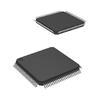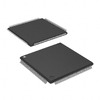Manufacturer Part Number
LCMXO1200C-4FT256C
Manufacturer
Lattice Semiconductor
Introduction
The LCMXO1200C-4FT256C is an embedded FPGA from Lattice Semiconductor's MachXO series, designed for a variety of applications requiring high-performance, low-power programmable logic solutions.
Product Features and Performance
150 LABs/CLBs (Logic Array Blocks/Configurable Logic Blocks)
1200 Logic Elements/Cells
9421 Total RAM Bits
211 I/O Pins
71V to 3.465V Supply Voltage Range
Surface Mount Technology
Operating Temperature Range from 0°C to 85°C
256-LBGA Packaging
Product Advantages
Offers programmable logic for a wide range of applications
Enhanced design flexibility with 211 I/O Pins
Small form factor and surface mount compatibility for dense board layouts
Low power consumption suitable for power-sensitive designs
Key Technical Parameters
Number of LABs/CLBs: 150
Number of Logic Elements/Cells: 1200
Total RAM Bits: 9421
Number of I/O: 211
Voltage - Supply: 1.71V to 3.465V
Mounting Type: Surface Mount
Operating Temperature: 0°C to 85°C
Package Type: 256-LBGA
Device Package: 256-FTBGA (17x17)
Quality and Safety Features
Built to stringent industry standards for quality and reliability
Ensures stable performance within the specified operating temperature range
Compatibility
Parts are compatible with standard surface mount process
Matches with systems requiring 1.71V - 3.465V power supply
Application Areas
Industrial controls
Consumer electronics interfaces
Automotive control units
Communication infrastructure
Medical devices
Product Lifecycle
Obsolete - Product is no longer in production
Potential need to look for replacement or upgrade due to discontinuation
Several Key Reasons to Choose This Product
High-density logic element count allows for complex logic design
High I/O pin count increases interfacing capability
Low power consumption ideal for handheld and power-sensitive applications
Suitable for a variety of environmental conditions with its wide operating temperature range
Lattice Semiconductor's reputation for quality and support in FPGA technologies




